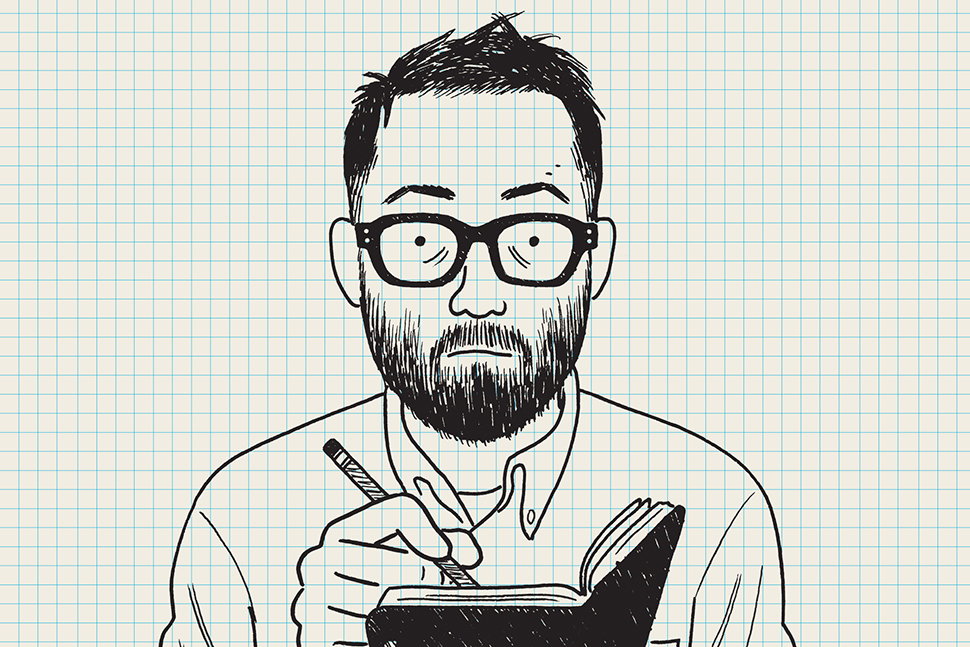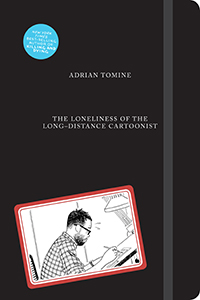Newsmaker: Adrian Tomine

With everything from New Yorker covers to New York Times–bestselling graphic novels under his belt, cartoonist and illustrator Adrian Tomine has had a more than successful career. But his newest autobiographical book, The Loneliness of the Long-Distance Cartoonist (Drawn & Quarterly, July), traces a lifetime of humiliations: disastrous book signings, rude reviews, a meal ruined by diners at an adjacent table viciously dissecting his latest work. Tomine turns his ability to cringe at his lowest moments into compulsively readable comics. After a series of COVID-related printing delays and a shift to a virtual book tour, Loneliness is now on shelves.
What pulls you toward recording the embarrassing side of things?
I guess it’s two things. One is that no one would want a book about what a wonderful and exciting career I’ve had. And I also don’t think that the two are mutually exclusive. It might be useful to some people to think that both experiences can exist simultaneously. It’s almost like those two aspects of life—the level of humiliation and the level of success—have evolved in tandem. They have remained at a proportional level to each other.

The book is printed like a Moleskine notebook, with graph-paper pages. What inspired this format?
It’s meant to replicate the actual sketchbooks that I work in. Now, more than ever, I feel this obligation to make books as special or as interactive or as interesting as possible, since everybody is always singing the praises of print and trying to encourage people to go buy books. I wanted something that would not only be kind of interesting and eye-catching and fun but would interact with and enhance the actual content of the book.
What’s planned for your virtual book tour?
We’re doing online events with a lot of the stores across the country that I was trying to do in person. Places like Books Are Magic in Brooklyn, and Powell’s in Portland, Oregon, and the Harvard Book Store in Cambridge, Massachusetts. And in most cases people will want to watch these things because of the other people I’m going to be talking to. A couple people are characters in the book: a cartoonist named Seth and an artist named Leanne Shapton. There’s the great British actor Michael Sheen. There’s the American comedian Wyatt Cenac. I worked hard to try to find an interesting group of friends to talk to, and I hope, if nothing else, people will be interested to see them on their screens.
Some panels in the book talk about the isolation and solitude of working from home. Right now, that’s a new reality for a lot of people. Has COVID-19 shifted your ideas of loneliness?
It’s actually made me crave loneliness a little bit. There’s such a vast range of experiences, and I know that some people are really experiencing extreme loneliness now in a way that they never have before. For me, I’ve been really deprived of solitude; that’s been a mainstay of my life since I was a kid. There hasn’t been a day since I was a teenager where I didn’t have at least a good chunk of time alone in a room by myself doing something creative. With two young kids at home, that experience has just been completely absent since March. In the future, if there’s ever a time where I’m sitting there working and I feel lonely, I’ll remember how much I missed it during this time.
What role have libraries played in your life?
Along with bookstores and coffee shops, they’ve been my escape, my hangout place outside the home. Both of my parents were university professors. A lot of my childhood was spent in campus libraries, roaming free. Discovering anything I wanted on my own—sitting there and diving deep into it. I’ve tried [to replicate that for my kids] because I feel like maybe now, even more than in a bookstore, a library is one of those places where you can let your children roam and browse and discover things that you might not have thought to put in their hands.
Source of Article